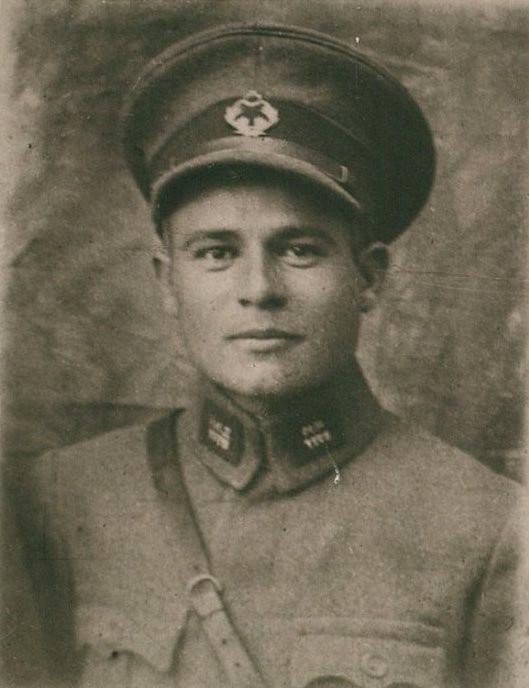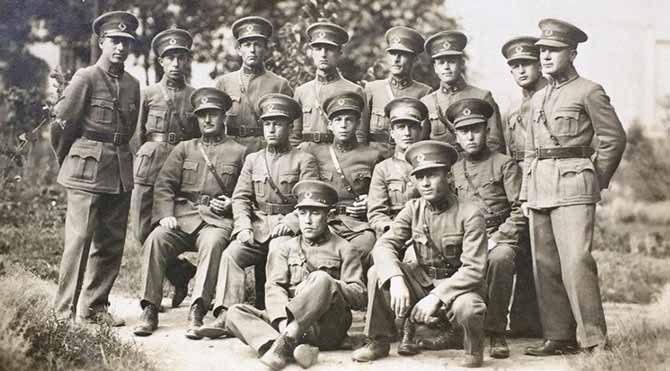Menemen Incident on:
[Wikipedia]
[Google]
[Amazon]

 The Menemen Incident, or Kubilay Incident ( tr, Kubilay Olayı or ''Menemen Olayı''), refers to a chain of events which occurred in
The Menemen Incident, or Kubilay Incident ( tr, Kubilay Olayı or ''Menemen Olayı''), refers to a chain of events which occurred in
''Those who wear hats are kaffirs. We will return to sharia soon.''
Mustafa Fehmi Kubilay, who had hidden himself in a mosque, was beheaded by the crowd with an axe who then placed his severed head on a pole with a green flag and paraded through town with it. Two municipal watchmen, Bekçi Hasan and Bekçi Şevki, were also killed by the demonstrators. Several rioters were also killed.
Upon hearing Kubilay's murder by Islamists, Atatürk proclaimed: '' Thousands from Menemen didn't prevent this, instead joined with tekbirs. Where were these traitors during Greek occupation?'' . The Turkish government expressed their shock over the people of Menemen not reacting to things like Menemen massacre as harsh as they did to secularization.
The perpetrators of the rebellion including Cretan Mehmet, Cretan Ibrahim, Mehmet of Damascus, Sütçü Mehmet Emin, Nalıncı Hasan and Little Hasan were killed or otherwise punished.


Menemen
Menemen is a district of İzmir Province in Turkey and its central town. The district extends on a fertile plain formed by the alluvial soil carried by the Gediz River. Adjacent districts are, from east to west; Aliağa and Foça to the north ...
, a small town north of İzmir in the Aegean Region
The Aegean Region () is one of the 7 geographical regions of Turkey. The largest city in the region is İzmir. Other big cities are Manisa, Aydın, Denizli, Muğla, Afyonkarahisar and Kütahya.
Located in western Turkey, it is bordered b ...
of Turkey
Turkey ( tr, Türkiye ), officially the Republic of Türkiye ( tr, Türkiye Cumhuriyeti, links=no ), is a transcontinental country located mainly on the Anatolian Peninsula in Western Asia, with a small portion on the Balkan Peninsula in ...
, on 23 December 1930.
Islamists rebelled against the secularization of Turkey by Atatürk and beheaded Mustafa Fehmi Kubilay, a teacher who was doing his military service and two other watchmen.
Rebellion
Following the signing of theTreaty of Lausanne
The Treaty of Lausanne (french: Traité de Lausanne) was a peace treaty negotiated during the Lausanne Conference of 1922–23 and signed in the Palais de Rumine, Lausanne, Switzerland, on 24 July 1923. The treaty officially settled the confl ...
in 1923, the Republican People's Party
The Republican People's Party ( tr, Cumhuriyet Halk Partisi, , acronymized as CHP ) is a Kemalist and social-democratic political party in Turkey which currently stands as the main opposition party. It is also the oldest political party ...
of Turkey
Turkey ( tr, Türkiye ), officially the Republic of Türkiye ( tr, Türkiye Cumhuriyeti, links=no ), is a transcontinental country located mainly on the Anatolian Peninsula in Western Asia, with a small portion on the Balkan Peninsula in ...
pursued a somewhat liberal policy towards Islam
Islam (; ar, ۘالِإسلَام, , ) is an Abrahamic monotheistic religion centred primarily around the Quran, a religious text considered by Muslims to be the direct word of God (or '' Allah'') as it was revealed to Muhammad, the ...
, promoting secularism while not taking a hard line against Islamic institutions and practices, believing that the secularism of their ideology was already taking root. This confidence was shaken on 23 December 1930, when Dervish Mehmet Efendi (Cretan Mehmet), a member of the Naqshbandi
The Naqshbandi ( fa, نقشبندی)), Neqshebendi ( ku, نهقشهبهندی), and Nakşibendi (in Turkish) is a major Sunni order of Sufism. Its name is derived from Baha-ud-Din Naqshband Bukhari. Naqshbandi masters trace their ...
(Turkish: ''Nakşibendi'') order, created a protest by rallying an armed crowd against the policies of the secular government and calling for the restoration of Sharia
Sharia (; ar, شريعة, sharīʿa ) is a body of religious law that forms a part of the Islamic tradition. It is derived from the religious precepts of Islam and is based on the sacred scriptures of Islam, particularly the Quran and the H ...
and the Caliphate
A caliphate or khilāfah ( ar, خِلَافَة, ) is an institution or public office under the leadership of an Islamic steward with the title of caliph (; ar, خَلِيفَة , ), a person considered a political-religious successor to th ...
. A squad of soldiers from the local garrison was sent to quell the demonstration. The leader of the soldiers, Mustafa Fehmi Kubilay, went into the crowd alone to convince them to surrender. A rebel shot and injured him and as a result the soldiers returned fire(using wooden bullets) upon the demonstrators.
The protestors, led by Cretan Mehmet shouted 
Government reaction
The new republican government of Turkey was shocked by the demonstration of religious fervor and by how readily it was embraced by some Turks, as it was completely antithetical to secularism. A state of emergency was declared and courts-martial were established which meted out sentences ranging from death at the gallows or life imprisonment to one year's confinement. There were also several acquittals.Sufi
Sufism ( ar, ''aṣ-ṣūfiyya''), also known as Tasawwuf ( ''at-taṣawwuf''), is a mystic body of religious practice, found mainly within Sunni Islam but also within Shia Islam, which is characterized by a focus on Islamic spirituality, ...
members were arrested around the country. Furthermore, it demonstrated that secularism was taking hold neither as quickly nor as deeply as the government would have liked. This spurred the government to action, and they began a more aggressive secularization reforms in response to the Menemen incident. The government carried out this policy by attempting to nationalise Islam through performing the Adhan
Adhan ( ar, أَذَان ; also variously transliterated as athan, adhane (in French), azan/azaan (in South Asia), adzan (in Southeast Asia), and ezan (in Turkish), among other languages) is the Islamic call to public prayer ( salah) in a mo ...
(Turkish: ''Ezan'') or call to prayer, in Turkish rather than Arabic
Arabic (, ' ; , ' or ) is a Semitic language spoken primarily across the Arab world.Semitic languages: an international handbook / edited by Stefan Weninger; in collaboration with Geoffrey Khan, Michael P. Streck, Janet C. E.Watson; Walte ...
. The government furthered secularization in schools by having the Quran
The Quran (, ; Standard Arabic: , Quranic Arabic: , , 'the recitation'), also romanized Qur'an or Koran, is the central religious text of Islam, believed by Muslims to be a revelation from God. It is organized in 114 chapters (pl.: , sing. ...
translated from Arabic into Turkish and read to the people on the radio and in the mosques in Turkish. These attempts reflected a comprehensive effort by the government to remove Islamic influences and entrench nationality over religion in Turkish culture. These efforts also showed a larger attempt on the part of the government to consolidate Turkish traditions and promote a Turkish identity to replace a dominantly Muslim one, as in the Ottoman Empire people were identified by the millet system
In the Ottoman Empire, a millet (; ar, مِلَّة) was an independent court of law pertaining to "personal law" under which a confessional community (a group abiding by the laws of Muslim Sharia, Christian Canon law, or Jewish Halakha) was al ...
according to their religion rather than ethnicity. These were done to replace the last vestiges of nostalgia for the abolished Caliphate
A caliphate or khilāfah ( ar, خِلَافَة, ) is an institution or public office under the leadership of an Islamic steward with the title of caliph (; ar, خَلِيفَة , ), a person considered a political-religious successor to th ...
and the broken-up Ottoman Empire
The Ottoman Empire, * ; is an archaic version. The definite article forms and were synonymous * and el, Оθωμανική Αυτοκρατορία, Othōmanikē Avtokratoria, label=none * info page on book at Martin Luther University) ...
in the aftermath of World War I.
Legacy
The monument of the Menemen Incident features a tall sculpture by Ratip Aşir Acudoğu which was erected in 1932. The Kubilay Memorial is a part of Kubilay Barracks, but open to the public. The area is landscaped and illuminated at night. A military honor guard stands continuous watch at the memorial site, which contains the graves of several Turkish soldiers who were killed in the line of duty. In the aftermath 28 people were hanged by the neck. * ''Cem Karaca'' - ''Bir Öğretmene Ağıt'' (song written in Kubilay's memory)Notes
{{ReflistReferences
* Ahmad, Feroz. Turkey: The Quest for Identity. Oneworld Publications, 2004. 1930 in Turkey History of the Republic of Turkey Islamic terrorism in Turkey Islamic terrorist incidents in the 20th century Islamism-related beheadings Islamist insurgencies 1930s in Islam